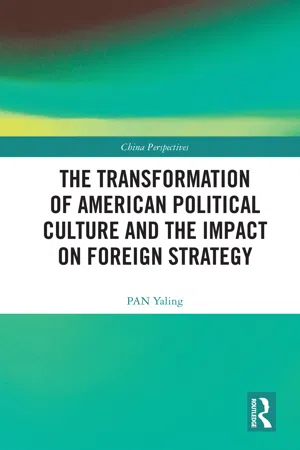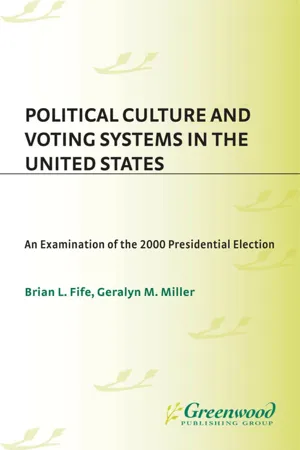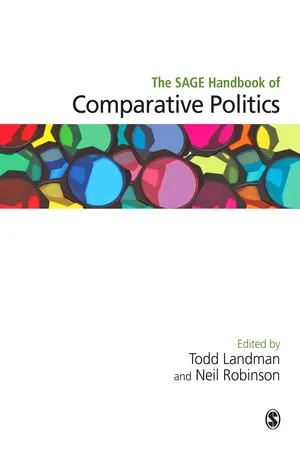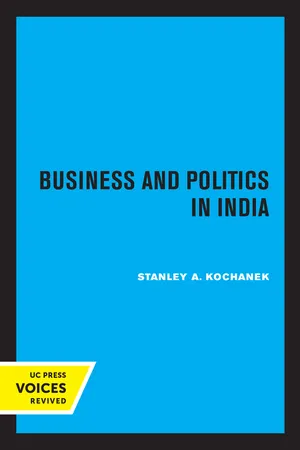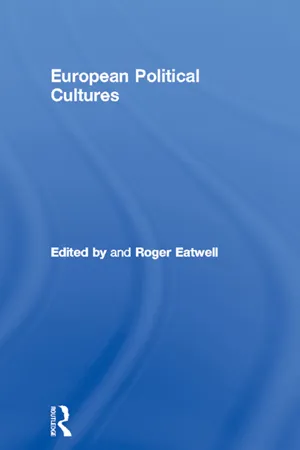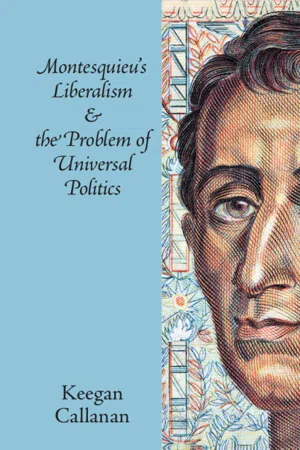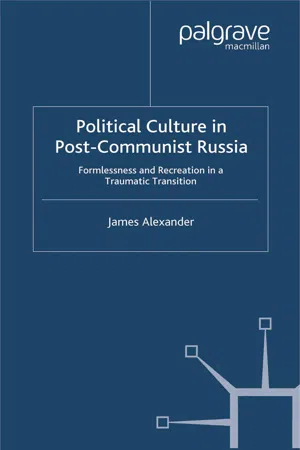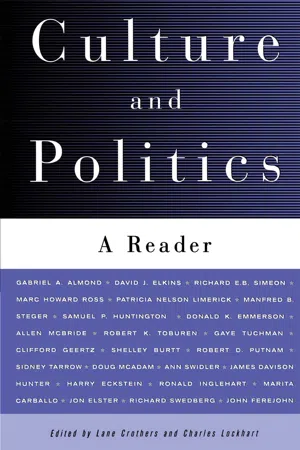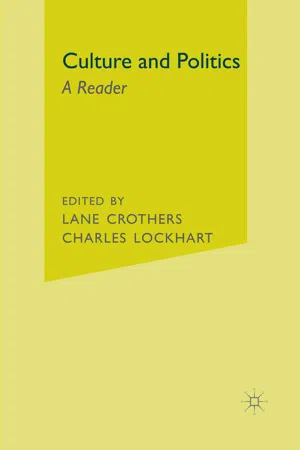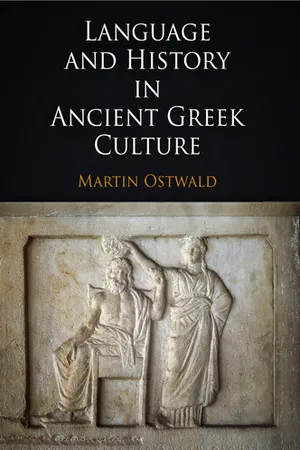Politics & International Relations
American Political Culture
American political culture refers to the shared values, beliefs, and attitudes that shape the political behavior and institutions in the United States. It encompasses principles such as individualism, liberty, equality, and democracy, and influences the way Americans view government, citizenship, and civic engagement. This culture has a significant impact on the country's political processes and policies.
Written by Perlego with AI-assistance
Related key terms
1 of 5
12 Key excerpts on "American Political Culture"
- PAN Yaling(Author)
- 2021(Publication Date)
- Routledge(Publisher)
5 Although such a concept quickly gained popularity, under the prevalence of behaviorism in the 1960s and 1970s, political culture was gradually regarded as a residual variable and lost its independent status. In the middle and late 1980s, the study of political culture was revived strongly. However, the debates about a range of aspects of political culture, including its very definition, connotation, types, and research methods, among others, are always there in both waves of research and are present even today. In sum, three levels of analysis have emerged from the literature, namely, political value, political institution, and political behavior, from a systematic level to a national level and then to an individual level.The core element of political culture is political values. To a large extent, political culture refers to the political belief of a society—it is the product of both the collective history of a political system and the life histories of the individuals who currently make up the system, and thus, it is rooted equally in public events and private experiences. American political scientist Lucian Pye defined political culture as the composite of basic values, feelings, and knowledge that underlie the political process.6 Hence, the building blocks of political culture are the beliefs, opinions, and emotions of the citizens toward their form of government. Political culture, according to Lucian W. Pye, is shaped by the general historical experiences of a country and the private and personal experiences of the individuals. It is because the individuals first became the members of society and then of the polity. Political culture is gradually built on the cumulative orientations of the people towards their political processes.7 Political culture is composed of tendencies accumulated by individual people in the political process, including the status of social power and authority, norms of evaluating performance, and regulations of expression of acceptable public passions, among others.8 Therefore, political culturemay be defined as the basic values, beliefs, ideas, attitudes, and orientations that citizens of different countries have about their political systems. Political culture refers to core values, not ephemeral ones: whether people accept the basic premises of their political system (democracy, separation of powers, civil liberties, etc.), not whether or not one approves of disapproves on a daily basis of how well the president is doing his job. Clearly, political culture can vary greatly from country to country, with some countries having a democratic, participatory, and more-or-less egalitarian political culture; others being more elitist, top-down, and authoritarian.9- eBook - ePub
The Devils We Know
Us and Them in America's Raucous Political Culture
- James A. Morone(Author)
- 2015(Publication Date)
- University Press of Kansas(Publisher)
PART IIs There an American Political Culture?Culture is simply the ensemble of stories we tell about ourselves.—Clifford GeertzPassage contains an image 1
Is There an American Political Culture?Culture is elusive. Analyzing it, wrote one historian, is a bit like nailing jelly to a post. But people know it when they see it. Germans talk about a “culture of solidarity”—the basis for a welfare state that is more than a century old. The French profess a faith in egalité and fraternité. Citizens of Thailand participate in elaborate networks of deference and patronage. And at least some Americans celebrate what they see as a heritage of rugged individualism. Every people operate with a culture: shared values, expectations, aspirations, and norms that grow out of history and myth.There are many formal definitions. E. B. Taylor, the founder of social anthropology, put it this way in 1871: “Culture . . . is that complex whole which includes knowledge, belief, art, morals, law, customs, and other capabilities and habits acquired by [people] as member[s] of society.” Margaret Mead boiled all that down to a simple phrase: the “shared, learned behavior of a society.” David Greenstone gave it a more political twist: “the framework of norms, symbols, assumptions, and expectations with which a people make sense of their experiences and formulate appropriate courses of action.” My favorite definition—the one I use—was coined by Clifford Geertz when he was an anthropologist at Princeton University: “Culture is simply the ensemble of stories we tell ourselves about ourselves.”1In the United States, the question of culture has always been entangled in the idea of American exceptionalism—the notion that the United States, uniquely, broke free from the bonds of culture, chance, and history. The Federalist Papers make the point right from the start: “It seems to have been reserved to the people of this country . . . to decide the important question, whether societies of men are really capable or not of establishing good government from reflection and choice.” The established “framework of norms, symbols, assumptions, and expectations,” as Greenstone put it, would not bind this new nation. Americans would found their new regime on reflection and reason.2 - eBook - PDF
Political Culture and Voting Systems in the United States
An Examination of the 2000 Presidential Election
- Brian L. Fife, Geralyn M. Miller(Authors)
- 2002(Publication Date)
- Praeger(Publisher)
Chapter 2 Political Culture in America Elazar (1994; 1984) contends that American Political Culture is rooted in two contrasting conceptions of the American political order, both of which have his- torical ties that trace back to the earliest "settlement" of the nation. From one conception, the political order is viewed as a marketplace where the primary pub- lic relationships are products of bargaining between individuals and groups act- ing in their own self-interest. This conforms to the framers' understanding of basic human behavior as documented in James Madison's notes of the debates that occurred at the Philadelphia Convention in 1787 (available on-line through the Avalon Project at Yale Law School—see Yale University Law School, 2002). The political order is viewed as a commonwealth in the second conception. As Elazar (1984) explains, citizens cooperate in order to create and maintain the best government in order to implement shared moral principles. Throughout Amer- ican history, these conceptions have rendered an influence on government and politics. At times, they have been in conflict; in other instances, they have com- plemented each other (p. 112). Elazar (1984) posits that these two conceptions exist in a matrix of values that form the culture of American civilization. The four values located between power and justice are efficiency (the achievement of objectives with the minimum ex- penditure of resources); legitimacy (those aspects of a polity that are believed to be supported by the underlying values of its populace); commerce (the exchange of goods, services, and ideas); and agrarianism (a vision of America as a com- monwealth of self-governing individuals, each with a tangible stake in his/her community, raised to heightened levels of human decency through the diffu- sion of knowledge, religion, and morality) (pp. 113-114). - eBook - PDF
- Todd Landman, Neil Robinson, Todd Landman, Neil Robinson(Authors)
- 2009(Publication Date)
- SAGE Publications Ltd(Publisher)
Political Culture Christian Welzel A stable and effective democratic government … depends upon the orientations that people have to the political process – upon the political culture. (Almond and Verba, 1963: 498) INTRODUCTION This chapter describes the place of the politi-cal culture paradigm in comparative politics. It outlines the paradigm’s fundamental premises and assumptions and sketches how research in this field has developed. Special emphasis will be placed on where I see the greatest contribution of the political culture approach: understanding the societal funda-ments of democracy and how these are trans-forming in the process of cultural change. In thinking about the driving forces behind democracy, the most basic assumptions of the political culture approach will be juxta-posed to those of the political economy approach. The chapter closes with some thoughts about the future research agenda of the political culture paradigm. DEFINITION Going back to Almond and Verba (1963: 13) the term political culture is usually understood ‘as the particular distribution of patterns of orientation toward political objects among the members of a nation.’ Thus, political culture is about the psychological dimension of political systems, including all politically relevant beliefs, values, and attitudes. Depending on what is the reference population one can dis-tinguish elite and mass cultures, local, regional and national cultures, as well as the subcul-tures of specific groups. Usually one would refer the concept to collective units of which people are aware and have some feeling of belongingness. To what extent actual political behavior is to be included in the notion of political culture is not always perfectly clear. Insofar, however, as certain patterns of behavior become habitual-ized, they manifest beliefs in the legitimacy of this behavior. In that sense, political habits can be considered as behavioral manifestations of political culture. 16 - eBook - PDF
The Politics of Downtown Development
Dynamic Political Cultures in San Francisco and Washington, D.C.
- Stephen J. McGovern(Author)
- 2014(Publication Date)
- The University Press of Kentucky(Publisher)
This, of course, leaves much unresolved. Assistance in identifying what is truly fundamental may be found by con-sidering previous attempts to elaborate the substantive content of political cul-ture. Daniel J. Elazar's study of American Political Culture is a good place to start because it has attracted considerable scholarly attention, much of it fo-cused on his classificatory criteria. In contrast to Louis Hartz's well-known thesis that Lockean liberalism has always dominated American politics, 26 Elazar contends that American Political Culture is actually an amalgam of three dis-tinct subcultures, each associated with a particular region of the country. First, a moralistic political culture developed in Puritan New England in which gov-ernment was seen as a positive force in promoting a moral society; all citizens were encouraged to participate in the public realm in a cooperative endeavor to further the common good. Second, an individualistic political culture emerged in the mid-Atlantic region. Here, the individual pursuit of private gain regulated only by the marketplace was considered the surest route to a Political Culture and Political Change 29 well-functioning and prosperous society. The government's role was limited to ensuring that the marketplace remained in sound working order; political par-ticipation was not valued, since politics was perceived to be the province of permanent politicians whose behavior was often corrupt. Finally, a tradition-alistic political culture, characterized by a strictly hierarchical view of the po-litical world, took root in the South. Power rested in the hands of established elites who had secured their preeminence in the community through genera-tions of family connections. They exercised political power in a paternalistic manner and discouraged citizen engagement in politics. The purpose of gov-ernment was to preserve the traditional way of life. - eBook - PDF
- Stanley A. Kochanek(Author)
- 2023(Publication Date)
- University of California Press(Publisher)
II POLITICAL CULTURE Political culture comprehends the configuration of individual attitudes toward politics as well as the organization of society which underlies the functioning of a political system. These attitudes and social patterns play an important role in setting aspirations and expectations, in- fluencing patterns of decision-making, and otherwise shaping acceptable political behavior. Ultimately this congruence gives legitimacy to the political system whose continuity, in the absence of such endorsement, is likely to be in jeopardy. Although the political system of modern India is modeled after the British example, it must function in a nation whose political experience, individual expectations, social structure, and societal values differ dramatically from those which produced the Parliament of Westminster. One of the results of British educational policy was to create in urban India what was, for a developing nation, a disproportionally large at- tentive public. The members of this segment of the population evince a keen interest in politics. They participate in a variety of political activities and hold clearly structured opinions about government policies, programs, and leadership. 1 Although urban opinion is sharply divided on a large number of issues, the intelligentsia as a whole has, in the past, tended to reflect a higher level of frustration and alienation than the rest of the society. In recent years this sense of alienation has also begun to develop within the Indian business community. Until recently, a more passive view of political life was exhibited by the numerous subsectors of the Indian society that include the illiter- ates, lower income groups, and rural population. These segments of the population have demonstrated little overt interest in politics and political activity. - eBook - ePub
- Roger Eatwell(Author)
- 2002(Publication Date)
- Routledge(Publisher)
1 Introduction
The importance of the political culture approach
Roger EatwellINTRODUCTION
Belief in the importance of studying the values which underpin politics can be traced back in time through a variety of major writers, including de Tocqueville in the nineteenth century (who clearly perceived the importance of individualism and the frontier spirit in American politics), and Aristotle and Plato in Ancient Greece (who wrote about a state of mind which encouraged stability or revolution, and the importance of socialisation in forming adults). It is also interesting to note that the Greeks attributed notably different characteristics to Athenians, Spartans, and Corinthians – as well as to the barbarian ‘Other’ (who encompassed peoples to the north and west, as well as the east).However, the actual term ‘political culture’ was coined in the 1950s by Gabriel Almond, an American political scientist, who argued that ‘Every political system is embedded in a particular pattern of orientations to political action’.1 Together with fellow academic, Sidney Verba, Almond went on in the early 1960s to publish a pioneering five-state (Britain, Italy, Mexico, USA, West Germany) study of such political cultures entitled The Civic Culture, which was based on opinion polls of some 1,000 respondents in each country during 1959.2 Behind Almond and Verba’s resulting collections of percentages was the theory that a stable democracy required a specific set of attitudes, based on a complex balance of ‘subject’ and ‘participant’ cultures, and needed high levels of system support and social trust fostered by overlapping memberships of different groups. Their data indicated that Britain and the USA were the paradigmatic ‘civic cultures’. Among the other social scientists who contributed notable early work in this area was Seymour Martin Lipset, who argued that long-enduring democracies were disproportionately found in the wealthier and more Protestant nations.3 - Keegan Callanan(Author)
- 2018(Publication Date)
- Cambridge University Press(Publisher)
See also Gabriel Almond and Sidney Verba, The Civic Culture: Political Attitudes and Democracy in Five Nations (New York: Sage, 1963), 13. For a useful summary of the debate concerning terminology of political culture, see Consuelo Cruz, Political Culture and Institutional Development in Costa Rica and Nicaragua: World Making in the Tropics (Cambridge University Press, 1999), 4–5, 27ff. 9 On the putative lack of conceptual clarity in the political culture school, see James Johnson, “Conceptual Problems as Obstacles to Progress in Political Science: Four Decades of Political Culture Research,” Journal of Theoretical Politics 15 (2003): 87–115; Ronald P. Formisano, “The Concept of Political Culture,” The Journal of Interdisciplinary History 31 (2001): 393–426; Werlin, “Political Change,” 96ff. 10 See especially Robert W. Jackman and Ross A. Miller, “A Renaissance of Political Culture?” American Journal of Political Science 40 (1996): 632–59; Robert W. Jackman and Ross A. Miller, “The Poverty of Political Culture,” American Journal of Political Science 40 (1996): 697–716. 11 Ronald Rogowski, Rational Legitimacy: A Theory of Political Support (Princeton Uni- versity Press, 1974). 12 Cruz, Political Culture, 21. 150 Understanding Liberal Culture mores, manners, received examples, religion, or the like. Second, he does not discount the importance of political and legal causes in explaining both political outcomes themselves as well as the formation of mores and customs. Like the Ancients, he repeatedly highlights the relationship of reciprocal causality that obtains between political institutions and culture. Montesquieu’s method shares much in common with more integrative approaches to the study of political change that recognize culture as one of several important forces in political life. 13 Third, Montesquieu’s polit- ical science manages to incorporate cultural variables without denying the possibility of political transformation.- eBook - PDF
Political Culture in Post-Communist Russia
Formlessness and Recreation in a Traumatic Transition
- J. Alexander(Author)
- 2000(Publication Date)
- Palgrave Macmillan(Publisher)
‘Modeling’ political culture dynamics In ‘normal’ political culture development, tools are acquired by the general population via socialization occurring in that society’ s histor y Political Culture as a Research Agenda 35 Figure 2.2 Political Culture and in the lives of individuals and groups (see figure 2.2). Socialization provides a political culture superstructure, or framework, manifested in the political tools individuals use to interpret their environment. Some tools are ‘shared political tools’ or portions of the framework that are broadly held by the population, and others are ‘variable tools’, specific individual and group characteristics (that is educa- tion, profession and ethnic identity). These tools allow meaning to be attached to the socio-political context confronting people every day that leads to individual and group political behavior . The context includes political institutions (parliament, president and so on), economic conditions (depression, boom and so on) and social issues (that is health care, epidemic and so on), and encom- passes elite and group activity individually and collectively. Domestic conditions generally dominate contextual influences, but interna- tional factors create a certain variability that may affect the domestic environment. These external factors include, but are not limited to, international war, the demands of economic institutions (that is the International Monetary Fund), imported consumer goods, environmental threats and foreign media. These influences affect the context and are a potentially supercharged component in the equation. - eBook - PDF
Culture and Politics
A Reader
- NA NA(Author)
- 2019(Publication Date)
- Palgrave Macmillan(Publisher)
I discuss the concept of psychocultural inter- pretations and their methodological relevance in the comparative study of cul- ture and politics for understanding processes such as ethnic and national identity construction. I conclude that culture is too often ignored as a domain of polit- ical life and that cultural analyses can enrich the ways we conceptualize areas such as political economy, social movements, and political institutions in a num- ber of ways, often complementing the insights derived from interest and institu- tional approaches. 42 Marc Howard Ross Culture and Cultural Analyses of Politics Culture Culture, a central concept in anthropology, has been defined in a wide variety of ways that variously emphasize culture as social organization, core values, spe- cific beliefs, social action, or a way of life (Kroeber and Kluckhohn 1952). Most contemporary analyses, however, begin, as I do here, with Geertz's definition of culture as "an historically transmitted pattern of meaning embodied in symbols, a system of inherited conceptions expressed in symbolic forms by means of which men communicate, perpetuate, and develop their knowledge about and attitudes towards life" (1973b, 89). 5 This view emphasizes culture as public, shared meanings; behaviors, institutions, and social structure are understood not as culture itself but as culturally constituted phenomena (Spiro 1984). Culture from this perspective is a worldview that explains why and how individuals and groups behave as they do, and includes both cognitive and affective beliefs about social reality and assumptions about when, where, and how people in one's cul- ture and those in other cultures are likely to act in particular ways (see also Berger 1995). 6 For purposes of political analysis, I want to emphasize that shared understandings occur among people who also have a common (and almost invariably named) identity which signals distinctions between the group and outsiders. - eBook - PDF
Culture and Politics
A Reader
- NA NA(Author)
- 2016(Publication Date)
- Palgrave Macmillan(Publisher)
I discuss the concept of psychocultural inter- pretations and their methodological relevance in the comparative study of cul- ture and politics for understanding processes such as ethnic and national identity construction. I conclude that culture is too often ignored as a domain of polit- icallife and that cultural analyses can enrich the ways we conceptualize areas such as political economy, social movements, and political institutions in a num- ber of ways, often complementing the insights derived from interest and institu- tional approaches. 42 Marc Howard Ross Culture and Cultural Analyses of Politics Culture Culture, a central concept in anthropology, has been defined in a wide variety of ways that variously emphasize culture as social organization, core values, spe- cific beliefs, social action, or a way of life (Kroeber and Kluckhohn 1952). Most contemporary analyses, however, begin, as I do here, with Geertz's definition of culture as "an historically transmitted pattern of meaning embodied in symbols, a system of inherited conceptions expressed in symbolic forms by means of which men communicate, perpetuate, and develop their knowledge about and attitudes towards life" (1973b, 89). 5 This view emphasizes culture as public, shared meanings; behaviors, institutions, and social are understood not as culture itself but as culturally constituted phenomena (Spiro 1984). Culture from this perspective is a worldview that explains why and how individuals and groups behave as they do, and includes both cognitive and affective beliefs about social reality and assumptions about when, where, and how people in one's cul- ture and those in other cultures are likely to act in particular ways (see also Berger 1995). 6 For purposes of political analysis,! want to emphasize that shared understandings occur among people who also have a common (and almost invariably named) identity which signals distinctions between the group and outsiders. - Martin Ostwald(Author)
- 2011(Publication Date)
- University of Pennsylvania Press(Publisher)
A Political Culture of the Polis 1 Shares and Rights: “Citizenship” Greek Style and American Style* The celebration of the anniversaries of three revolutionary events that have shaped the social and political outlook of the world affords a welcome excuse to take a close look at some of the assumptions on which our social and political system is based. Two of these events mark the triumph over an internal tyrannical régime: the reforms of Cleisthenes of about 508 b.c.e ., which laid the groundwork for Athenian democracy, and the Déclaration des droits de l’homme et du citoyen, adopted by the French Assembly in 1789 . The American Declaration of Independence of 1776 , followed in 1789 by the Constitution of the United States and two years later by the Bill of Rights, constitutes the liberation from an oppressive external colonial rule. What can these three events teach us in an age, which is trying to find multicultural values beyond the Western world? I believe that the multicul-turalism we seek is best approached through exploring the multicultural-ism that is already part of our tradition, and I propose to deal with one of its features first. Citizenship, as the late Charles Norris Cochrane observed, is one of the two fundamental concepts that Hellenism bequeathed to Western civiliza-tion. 1 But concepts of citizenship also differentiate basic American attitudes so fundamentally from those of the ancient Greeks that a comparison of the * This paper was originally delivered as the keynote address of the conference on “Democ-racy Ancient and Modern,” held under the auspices of the American School of Classical Studies in Washington, D.C., in the spring of 1993 . It was published under the present title in Demokratia: A Conversation on Democracies, Ancient and Modern , ed. Josiah Ober and Charles Hedrick (Princeton: Princeton University Press, 1996 ), 49–61 , reprinted by permission of Princeton University Press.
Index pages curate the most relevant extracts from our library of academic textbooks. They’ve been created using an in-house natural language model (NLM), each adding context and meaning to key research topics.
